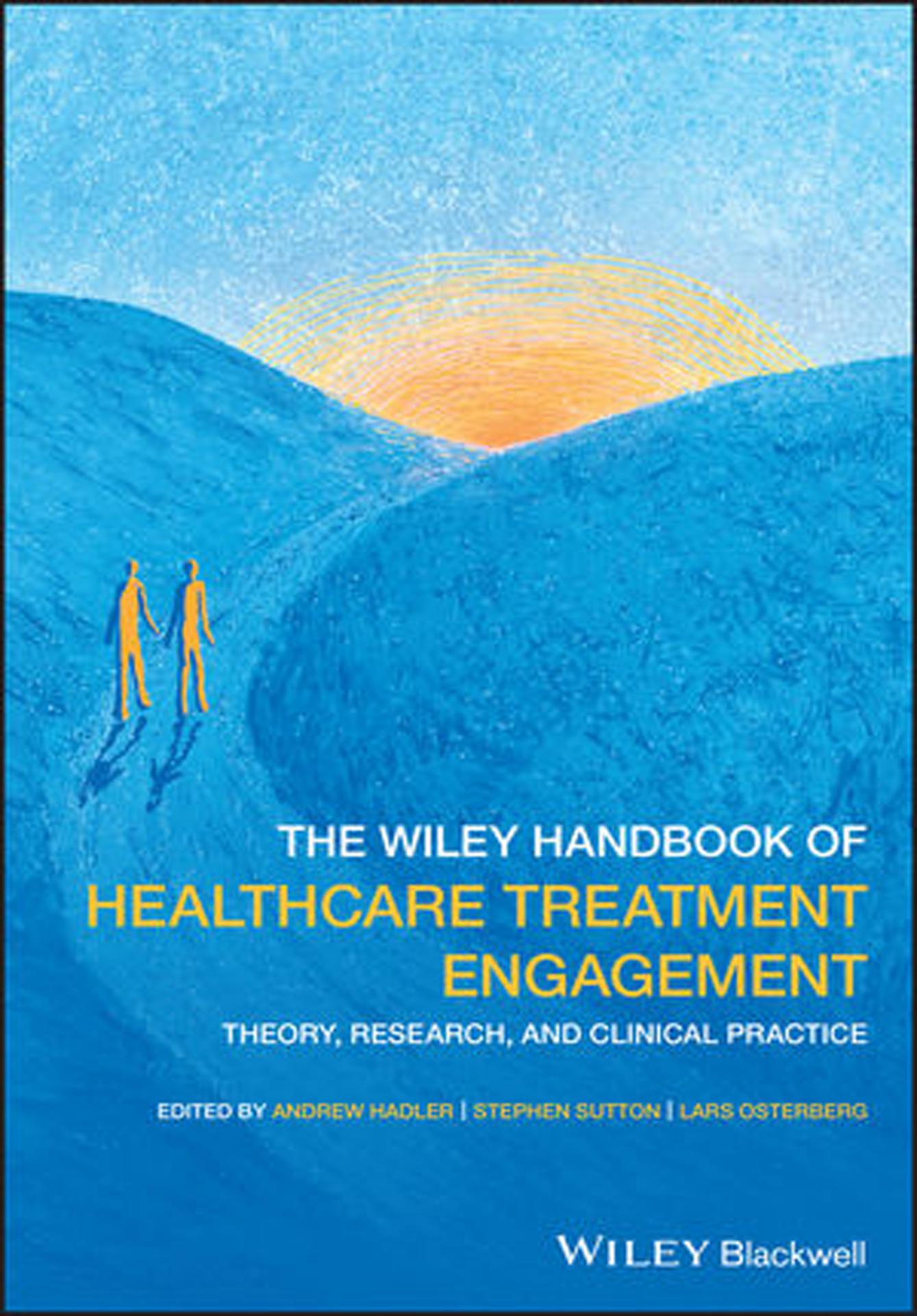The Wiley Handbook of Healthcare Treatment Engagement
Theory, Research, and Clinical Practice
Edited by Andrew Hadler Stephen Sutton and Lars Osterberg
This edition first published 2020 © 2020 John Wiley & Sons Ltd
All rights reserved. No part of this publication may be reproduced, stored in a retrieval system, or transmitted, in any form or by any means, electronic, mechanical, photocopying, recording or otherwise, except as permitted by law. Advice on how to obtain permission to reuse material from this title is available at http://www.wiley.com/go/permissions.
The right of Andrew Hadler, Stephen Sutton, and Lars Osterberg to be identified as the authors of this editorial material in this work has been asserted in accordance with law.
Registered Offices
John Wiley & Sons, Inc., 111 River Street, Hoboken, NJ 07030, USA
John Wiley & Sons Ltd, The Atrium, Southern Gate, Chichester, West Sussex, PO19 8SQ, UK
Editorial Office
The Atrium, Southern Gate, Chichester, West Sussex, PO19 8SQ, UK
For details of our global editorial offices, customer services, and more information about Wiley products visit us at www.wiley.com.
Wiley also publishes its books in a variety of electronic formats and by print‐on‐demand. Some content that appears in standard print versions of this book may not be available in other formats.
Limit of Liability/Disclaimer of Warranty
While the publisher and authors have used their best efforts in preparing this work, they make no representations or warranties with respect to the accuracy or completeness of the contents of this work and specifically disclaim all warranties, including without limitation any implied warranties of merchantability or fitness for a particular purpose. No warranty may be created or extended by sales representatives, written sales materials or promotional statements for this work. The fact that an organization, website, or product is referred to in this work as a citation and/or potential source of further information does not mean that the publisher and authors endorse the information or services the organization, website, or product may provide or recommendations it may make. This work is sold with the understanding that the publisher is not engaged in rendering professional services. The advice and strategies contained herein may not be suitable for your situation. You should consult with a specialist where appropriate. Further, readers should be aware that websites listed in this work may have changed or disappeared between when this work was written and when it is read. Neither the publisher nor authors shall be liable for any loss of profit or any other commercial damages, including but not limited to special, incidental, consequential, or other damages.
Library of Congress Cataloging‐in‐Publication Data
Names: Hadler, Andrew, 1975– editor. | Sutton, Stephen, editor. | Osterberg, Lars, editor.
Title: The Wiley handbook of healthcare treatment engagement : theory, research, and clinical practice / edited by Andrew Hadler, Stephen Sutton, and Lars Osterberg.
Other titles: Handbook of healthcare treatment engagement
Description: Hoboken, NJ : Wiley-Blackwell, 2020. | Includes bibliographical references and index.
Identifiers: LCCN 2019042668 (print) | LCCN 2019042669 (ebook) | ISBN 9781119129493 (hardback) | ISBN 9781119129523 (adobe pdf) | ISBN 9781119129516 (epub)
Subjects: MESH: Patient Participation | Professional-Patient Relations | Communication
Classification: LCC R727.3 (print) | LCC R727.3 (ebook) | NLM W 85 | DDC 610.69/6–dc23
LC record available at https://lccn.loc.gov/2019042668
LC ebook record available at https://lccn.loc.gov/2019042669
Cover Design: Wiley
Cover Image: © Mathilde Le Coutour
Set in 10/12pt Galliard by SPi Global, Pondicherry, India
Katherine Berr y and Adam Danquah
Vivian Auyeung, L yndsay D. Hughes, and John A. Weinman
M. Br yant Howren, Anne I. Roche, and Alan J. Christensen
Mollie A. Ruben, Danielle Blanch‐Hartigan, and Judith A. Hall 16
Geof frey P. Taylor and Deborah L. Cabaniss 17 Enhancing Wellbeing and Motivation for Staf f Working
Aswita Tan‐McGror y, Andrea O. Madu, Karey S. Kenst, and Joseph R. Betancourt
Michael A. Rapoff and Ali Calkins‐Smith
Jo Anne Sirey and Patricia Marino
Thomas
Andrew L. Ellner, Jessica L. Alpert, Chris Desmond, and Ashwin Vasan
Foreword
A chasm separates what we know from sound scientific research to be potentially beneficial for healthcare and what we achieve for people with health disorders. This is a very complicated problem, with many known and unknown contributors. Arguably, the most important general contributor is a lack of acceptance by people of the prescriptions of practitioners, especially for treatments that are to be self‐administered, such as medicines, exercise, and diet. We have a considerable knowledge now that can be applied, but we also need new thinking and new knowledge to bridge the chasm. The contributors to this book combine expertise and evidence to advance this mission, especially in relation to patient engagement in recommendations for their healthcare, and also for engaging practitioners in this process.
People not following medical advice for self‐administered healthcare treatments has no doubt been happening since the beginning of human existence – and this shows no sign of abating. Initially, it is fair to say that this trait provides some protection against prescribed treatments that are worthless or cause more harm than good. There are many such prescriptions and treatments to this day, but current times are different in at least one important way. Clinicians now deal with many health conditions for which efficacious treatments have been validated, and this list grows daily. What was once justifiable self‐defense against quackery, and is still justifiable for many healthcare treatments, has now also become a major tragedy of our times.
Simple algebra illustrates the problem. A 25% relative risk reduction in patient‐important health outcomes is a moderately large effect for the efficacy of a new treatment compared with other treatments, or “usual care,” but typically no more than 50% of practitioners will prescribe new treatments within a generation of their validation and no more than 50% of people who could benefit will adhere to the intervention if prescribed. Thus, a net benefit is achieved of no more than (25% x 50% x 50% =) 6% at best. For example, for many people with atrial fibrillation oral anticoagulants can reduce the risk of stroke by over 50%, but surveys show that clinicians prescribe anticoagulants for only about 50% of eligible patients, and of patients for whom anticoagulants are prescribed only about 40% take them as intended, whittling a 50% relative benefit down to about 10%. About 5% of middle‐aged people have atrial fibrillation and 3% of these will suffer a stroke over a 15‐year period as a result of the atrial fibrillation. Anticoagulation, fully applied, would reduce the attributable stroke rate to 1.5% or less, but at current uptake rates only to 2.7%. Extrapolated worldwide, annually, this is the difference of over 86 000 strokes aver ted per year versus over 17 000 strokes aver ted per year.
Overcoming this problem is inherently complex, as it requires simultaneous solutions for both practitioner and patient actions to gain traction. For instance, increasing appropriate prescribing from 50% to 75%, without increasing patient adherence, would increase the benefit to only 15%, whereas increasing both prescribing and adherence to 75% would increase the net benefit to 28%. To make matters worse, increasing either practitioner or patient acceptance for unvalidated or discredited interventions would have adverse effects without benefits. At present, efficiently, consistently, and affordably resolving this problem is beyond our understanding and reach.
The knowledge–practice gap exists for virtually all health interventions. The loss that it causes for return on investment in research is staggering and assuredly leads to more deaths and suffering than any natural disaster in human history.
I first became familiar with “patient compliance” (as it was referred to at the time) when I was a graduate student working with Professor David Sackett at McMaster University in 1971. At that time, hypertension was one of the first chronic medical conditions for which efficacious treatments had been discovered and the problem of patient compliance had been documented as a barrier to blood pressure control through a growing number of observational studies. The more I looked into the topic, the more fascinated, mystified, and horrified I became. What was the point of doing healthcare research if so few practitioners and patients “bought in”? What validated remedies for the problem existed? What approaches were promising but inadequately tested? At the time “patient education” based on education theory and “cues and rewards” based on behavioral psychology were in fashion, but there were no randomized trials of any intervention showing effects on patient‐important outcomes. Today, thousands of studies later, including hundreds of trials, we have documented the lack of efficacy of many interventions (including most forms of patient education), and the efficacy of a few interventions, but none with a substantive effect on patient‐important outcomes or the simplicity that would allow widespread implementation (Nieuwlaat et al. 2014).
Clearly, we need new thinking and insights into this pervasive problem! The editors, Andrew Hadler, Stephen Sutton, and Lars Osterberg, have assembled an impressive, transdisciplinary team of experts from around the world, working under the theme of a fresh perspective, “patient engagement.” The authors comprehensively review what we know, what we can apply now, what is promising, but needs further testing, or refining for practical application, and where the frontier is for creating new knowledge. All clinicians and as many scientists as possible are needed for traveling this last mile for getting healthcare knowledge into practice.
R. Brian Haynes MD, PhD Professor Emeritus, McMaster University
Reference
Nieuwlaat R, Wilczynski N, Navarro T, Hobson N, Jeffery R, Keepanasseril A, Agoritsas T, Mistry N, Iorio A, Jack S, Sivaramalingam B, Iserman E, Mustafa RA, Jedraszewski D, Cotoi C, Haynes RB. Interventions for enhancing medication adherence. Cochrane Database of Systematic Reviews 2014, Issue 2. Art. No.: CD000011. DOI:https://doi. org/10.1002/14651858.CD000011.pub4
Notes on Contributors
Jessica L. Alpert is a case writer and researcher at the Harvard Medical School Center for Primary Care, Boston, Massachusetts.
Vivian Auyeung is Senior Lecturer in Medicines Use at the Institute of Pharmaceutical Science, King’s College London. Her research aims to integrate the disciplines of health psychology with pharmacy; specifically, tackling the problem of medicines non‐adherence by designing and testing scalable and sustainable pharmacy‐led solutions based on psychological theories.
Thomas R.E. Barnes is Emeritus Professor of Clinical Psychiatry at Imperial College, London, and joint head of the Prescribing Observatory for Mental Health at the Royal College of Psychiatrists. His research in schizophrenia and its treatment has generated over 300 publications. He is a co‐editor of The Maudsley Prescribing Guidelines in Psychiatry and has been a member of schizophrenia treatment guideline development groups for both the National Institute for Health and Care Excellence and the British Association for Psychopharmacology.
Paul Barr is a member of Faculty at the Dartmouth Institute for Health Policy & Clinical Practice, Hanover, New Hampshire, where he leads the “Open Recordings” research group. He is a health‐services researcher, promoting greater transparency in healthcare and working at the intersections of technology, patient‐ and family‐centered communication and shared decision‐making. He is the recipient of the Gordon and Betty Moore Patient and Family Engagement Award. Paul received his PhD (Public Health) and BSc (Psychology) from Queen’s University, Belfast, Ireland, and received an MSc in Public Health (Health Services Research stream) from the London School of Hygiene and Tropical Medicine, London UK.
Katherine Berry is a senior lecturer and clinical psychologist who is based at the University of Manchester. Her main area of expertise is attachment theory and therapeutic relationships in people with a diagnosis of psychosis. She currently works on the Manchester Clinical Psychology Training Programme and as a clinical psychologist in mental health rehabilitation.
Joseph R. Betancourt MD MPH is the founder and director of the Disparities Solutions Center, Senior Scientist at the Mongan Institute for Health Policy at Massachusetts General Hospital, and an Associate Professor of Medicine at Harvard Medical School. Dr. Betancourt has authored peer‐reviewed articles on topics including racial/ethnic disparities in health and healthcare; public health; cross‐cultural care and education; clinical decision‐making; ethics; workforce diversity; and the impact of language barriers on healthcare.
Danielle Blanch‐Hartigan PhD MPH is Assistant Professor of Health Studies in the Department of Natural and Applied Sciences and Director of the Health Thought Leadership Network at Bentley University in Waltham, Massachusetts. Danielle holds a PhD in Psychology from Northeastern University, a Masters in Public Health from Harvard School of Public Health and completed postdoctoral training as a Cancer Prevention Fellow in the Behavioral Research Program and Office of Cancer Survivorship at the National Cancer Institute. Her interdisciplinary research in psychology and public health aims to understand patient perceptions and improve the patient‐care experience. Dr. Blanch‐Hartigan has published over 45 articles in peer‐reviewed journals across psychology, health communication, and medicine.
Jed Boardman is a psychiatrist and Senior Lecturer in Social Psychiatry at the Institute of Psychiatry, Psychology, and Neuroscience. He is Senior Policy Adviser at the Centre for Mental Health and lead for Social Inclusion at the Royal College of Psychiatrists where he advises on employment and welfare benefit matters. He chaired the Royal College of Psychiatrists Social Inclusion Scoping Group.
Hayden Barry Bosworth is the Associate Director of the Center for Health Services Research in Primary Care at the Durham Veterans Affairs Healthcare System. He is also a Professor of Medicine, Psychiatry, Population Health Science, and Nursing at Duke University Medical Center. His research provides knowledge for improving patients’ treatment adherence and self‐management in chronic care. Dr. Bosworth has authored over 280 peer‐reviewed publications, over 70 of which address treatment adherence.
Wendy Bryant, is Senior Lecturer and Subject Lead for Occupational Therapy at the University of Essex. Wendy has practiced as an occupational therapist since 1984 in a wide range of UK settings including social care. Her research has been focused on collaborating with service users and providers, using participatory and creative methods.
Deborah L. Cabaniss MD is Professor of Clinical Psychiatry and Associate Director of Residency Training in the Columbia University Department of Psychiatry. In that role she teaches psychodynamic psychotherapy to residents and coordinates teaching and supervising of psychotherapy in the residency. She is the winner of numerous teaching awards and is a Training and Supervising Analyst at the Columbia University Center for Psychoanalytic Training and Research. Her books, Psychodynamic Psychotherapy: A Clinical Manual and Psychodynamic Formulation, are widely used and translated.
Ali Calkins‐Smith received her PhD in Clinical Psychology with a Major Area of Study in Clinical Health Psychology from the University of Kansas in 2018. She
completed her Pre‐doctoral Clinical Internship and Post‐doctoral Fellowship at Children’s Mercy Hospital in Kansas City, Missouri. Her research and clinical interests are both broadly in the area of pediatric psychology with specific interests in adherence and pediatric chronic pain. Her dissertation was titled, “Adherence Behaviors in Youth Following the Completion of an Intensive Pain Rehabilitation Program.” Dr. Calkins‐Smith became licensed in 2019 and started her first position as the sole psychologist in a well‐established primary care pediatric office in Kansas.
Chia‐Hsin Emily Cheng is Lecturer of Psychology and Health Science at California State University, Fullerton. She has served as co‐principal investigator of a CDC funded interdisciplinary obesity research project and as evaluation analyst on several health promotion programs in minority communities. She is on the editorial board of the Californian Journal of Health Promotion and is a doctoral candidate at the University of California, Los Angeles.
Alan J. Christensen PhD is Professor and Collegiate Fellow in the Department of Psychology and Professor in the Department of Internal Medicine at the University of Iowa. He currently serves as Editor‐in‐Chief of the Journal of Behavioral Medicine and is a Past President of the Society of Behavioral Medicine. He has studied issues involving patient treatment adherence and self‐management in chronic illness for over three decades.
Anne Cohen is a current Masters Student in the Nutrition and Exercise Physiology program at Teachers College, Columbia University and has a BA in Behavioral Biology from Johns Hopkins University. She previously worked as a Research Assistant at the Center for Behavioral Intervention Technologies at Northwestern University.
Jason P. Connor is a clinical psychologist, Director of the Centre for Youth Substance Abuse Research, and Professor of Clinical and Health Psychology at the University of Queensland.
Michael Copenhaver is a Professor of Health Promotion in the Department of Allied Health Sciences and a principal investigator at the Institute for Collaboration on Health, Intervention, and Policy (InCHIP) at the University of Connecticut, and a licensed clinical psychologist in Connecticut. He conducts primarily NIH/NIDA‐funded research aimed at developing and adapting evidence‐based behavioral HIV prevention interventions for optimal use in real world clinical settings (drug treatment, prison) where high‐risk drug users may be more efficiently reached. Dr. Copenhaver has been at the University of Connecticut since 2002.
Paul Crawshaw is Professor of Sociology and Dean of the School of Social Sciences, Humanities and Law at Teesside University, UK. A medical sociologist by training, he has published extensively on health improvement interventions, behavioural change, and sociologies of risk in a range of international journals, including Social Science and Medicine and Critical Social Policy. A former editor of Critical Public Health, he continues to contribute substantially to debates on health, wellbeing, and social policy, with particular interest in complex interventions.
Adam Danquah is a Lecturer in Clinical Psychology at the University of Manchester. He has particular interests in attachment theory and psychoanalysis. Clinically he works in secondary care adult mental health for Pennine Care NHS Foundation Trust. As well as being a Clinical Psychologist, Adam is a Psychodynamic Psychotherapist.
Chris Desmond is the Director of the Centre for Liberation Studies in Durban, South Africa.
Seeta Durvasula is a Senior Lecturer in the Faculty of Medicine and Health, University of Sydney. She is also the Clinical Director of two specialized multidisciplinary health clinics for people with intellectual disability and complex health conditions. Seeta has over 30 years of clinical experience in health assessment and healthcare in people with intellectual disability. Her research areas are in mortality, falls, frailty, and health outcomes in people with intellectual disability.
Andrew L. Ellner is an Associate Physician and Assistant Professor of Medicine, Division of Global Health Equity, Brigham and Women’s Hospital, and director of the Program in Global Primary Care and Social Change, Harvard Medical School, Boston, Massachusetts.
Glyn Elwyn is a clinician, researcher, and innovator. He is a tenured professor at the Dartmouth Institute for Health Policy and Clinical Practice, USA, and at the Scientific Institute for Quality of Healthcare, Radboud University Nijmegen Medical Centre, the Netherlands. He leads an international interdisciplinary team examining the implementation of shared decision‐making into clinical settings. He investigates the design and impact of Option Grids™ patient decision aids, evidence‐based tools that empower people to choose the care that suits them best. He has developed the Observer OPTION and collaboRATE, measures of shared decision‐making. He is the lead editor of Shared Decision‐Making: Evidence‐Based Patient Choice (3rd edn., 2016). He has authored 369 peer‐reviewed publications.
Bill (K.W.M.) Fulford is a Fellow of St. Catherine’s College and Member of the Philosophy Faculty, University of Oxford, Emeritus Professor of Philosophy and Mental Health, University of Warwick Medical School, and Director of the Collaborating Centre for Values‐based Practice, St. Catherine’s College, Oxford (valuesbasedpractice.org). His Essential Values‐based Practice (2012), co‐authored with Ed Peile, is the launch volume for a new series from Cambridge University Press on values‐based medicine.
Robin E. Gearing PhD LCSW is an Associate Professor and Director of the Center for Mental Health Research and Innovations in Treatment Engagement and Service at the University of Houston. Dr. Gearing’s research focuses on improving the mental health outcomes of adolescents and young adults with serious mental illnesses, and their families. His research is driven by an interest in informing and improving engagement and adherence to empirically supported psychosocial and medication treatment, and developing evidence‐based interventions. This interest is the result of more than 20 years of clinical work with adolescents and young adults, of having firsthand professional knowledge of the needs and gaps in the field, and of seeing uneven efforts to
manage the devastating functional, emotional, and fiscal costs of serious mental health conditions. His research nationally and internationally concentrates on treatment engagement and adherence in relation to mental health treatment, cultural adaptation, service delivery, and service utilization.
Sunita Guha received her Doctorate in Clinical Psychology from the Trent Course (Universities of Nottingham and Lincoln, UK) in 2013. Since qualifying, she has specialized in working with individuals with complex developmental and communication difficulties, developing skills and expertise through working in a variety of settings, including forensic, inpatient, crisis teams and in the community. She is particularly interested in how people and systems cooperate in the delivery of services. She regularly teaches on the Leicester and Trent clinical psychology doctorates on subjects linked to intellectual and developmental disabilities, adapted working and systemic family practice.
Peter M. Haddad is an Honorary Professor of Psychiatry at the University of Manchester, UK, and a Senior Consultant Psychiatrist at Hamad Medical Corporation, Qatar. He previously worked as an NHS Consultant Psychiatrist in Manchester for 20 years. His research focusses on psychosis and affective disorders. He has authored over 170 publications and has been a member of treatment guidelines groups for both the National Institute for Health and Care Excellence and the British Association for Psychopharmacology.
Martin S. Hagger PhD is John Curtin Distinguished Professor at Curtin University, Perth, Australia, and Finland Distinguished Professor, University of Jyväskylä, Jyväskylä, Finland. His research focuses on the development of integrated theories to predict, understand, and change health‐related behavior in multiple contexts and populations. His most recent publication is (with D.K.C. Chan, C. Protogerou, and N.L.D. Chatzisarantis) “Using meta‐analytic path analysis to test theoretical predictions in health behavior: An illustration based on meta‐analyses of the theory of planned behavior,” Preventive Medicine, 89, 154–161.
Judith A. Hall received her PhD from Harvard in Social Psychology and was on the faculty at the Johns Hopkins University before moving to Northeastern University, where she is University Distinguished Professor. Dr. Hall has been Editor‐in‐Chief of Patient Education and Counseling and the Journal of Nonverbal Behavior, and has published over 200 articles, chapters, and books on interpersonal interaction and non‐verbal communication, including in the physician–patient context.
Rob Horne is Professor of Behavioural Medicine at University College London. His research focuses on the role of psychological and behavioral factors in explaining variation in response to treatment. His current interests center on the development of interventions to support engagement with essential treatments and on optimizing the non‐specific effects (placebo and nocebo components) of medicines. He is a Founding Fellow of the Royal Pharmaceutical Society and Fellow of the Faculty of Pharmaceutical Medicine.
M. Bryant Howren PhD MPH is the Co‐Director of the VA Office of Rural Health Resource Center located at the Iowa City VA Medical Center and an Assistant
Professor of Psychology at the University of Iowa. Dr. Howren is broadly interested in treatment adherence and illness self‐management, is an Associate Editor for Journal of Behavioral Medicine, and has published articles in Health Psychology, Annals of Behavioral Medicine, and Journal of Consulting and Clinical Psychology.
Lyndsay D. Hughes is a Lecturer in Health Psychology at the Institute of Psychiatry, Psychology and Neuroscience, King’s College London. Lyndsay has been researching the psychosocial factors related to medication adherence in a range of conditions for the past 10 years. She has a particular interest in supporting people in taking their medication through theory‐driven interventions and in advocating the patient perspective to healthcare professionals to promote shared decision‐making and treatment engagement.
Richard Huxtable is Professor of Medical Ethics and Law, and Director of the Centre for Ethics in Medicine, University of Bristol, UK. He has published numerous books and articles on healthcare ethics and law, particularly on end‐of‐life decision‐making, surgical ethics, and clinical ethics. Richard is an editor of BMC Medical Ethics and a trustee of the UK Clinical Ethics Network and the National Council for Palliative Care. Twitter: @DrRHuxtable.
Lawrence Jones started his career working in the community with hard to place ex‐offenders. He initially trained as a forensic psychologist and worked in the prison service, primarily with life sentence prisoners and people who had a personality disorder diagnosis. He then went on to train as a clinical psychologist and work in Rampton Hospital where he is currently a Consultant Clinical and Forensic Psychologist and Head of Psychology. He is an Honorary Associate (Clinical) Professor at Nottingham University and teaches on the forensic doctorate there. He also teaches on the Leicester and Sheffield clinical psychology doctorates. He has published on motivational intervention assessment with people who have offended, working with people who have personality disorder diagnoses, case formulation, working with people who have offended sexually, and trauma‐informed milieu in forensic settings.
Pramila Karki is currently completing her master’s degree in health promotion at the University of Connecticut. Her research interests include HIV/AIDS and sexually transmitted diseases, healthcare disparities, and program evaluation. Her current research involves assessing how people who use drugs (PWUD) value specific attributes of Pre‐Exposure Prophylaxis (PrEP) programs. She also works as a research assistant on a NIDA‐funded project, Secondary HIV Prevention and Adherence Among HIV‐infected Drug Users, under the direction of Dr. Michael Copenhaver.
Karey S. Kenst MPH is the Senior Program Manager at the Disparities Solutions Center. She has over 12 years of professional experience in the areas of international humanitarian response, LGBT health, and sexual violence prevention and response. She is dedicated to working with institutions and communities to advance health equity and believes in collaborative, interdisciplinary approaches that reach beyond clinical settings to address the social determinants of health.
Nikolaj Kunøe PhD is a Clinical Psychologist specializing in addiction treatment. He is Clinical Research Adviser at the Lovisenberg Deaconal Hospital, Division of Mental Health, and Postdoctoral Fellow at the Norwegian Centre for Addiction Research (SERAF), at the University of Oslo, Norway. His key research areas include alcohol and opioid addiction, pharmacotherapies for addictive disorders, prison health, and relapse prevention.
Emily G. Lattie is a Research Assistant Professor in the Department of Preventive Medicine at Northwestern University and a faculty member within Center for Behavioral Intervention Technologies. Dr. Lattie received her PhD in clinical health psychology from the University of Miami. Her current research focuses on the use of technology‐enabled services to promote health and wellbeing.
Sharon Lawn is Director of Flinders Human Behaviour and Health Research Unit, Department of Psychiatry, Flinders University, Australia. She worked in several healthcare services prior to her current role and has led many research projects in mental health, consumer and career perspectives, health‐system change, workforce development, and chronic condition management. Sharon is a national advocate in the mental health field, winning several awards for her work in supporting health‐system change.
Peter Lewis is Senior Lecturer and Director Academic Workforce, in the School of Nursing and Midwifery at Western Sydney University. He worked as a registered nurse specializing in paediatrics for more than 15 years. Peter occupied a number of clinical roles before pursuing an academic career. He combines school governance responsibilities with research interests in the development of care models for people with intellectual and developmental disability and nursing history.
Alex Lord is a Forensic Psychologist at Broadmoor Hospital. He is on the editorial board of the Journal of Forensic Practice and previously worked in HM Prison Service and was Visiting Lecturer at Surrey University. His PhD was on leadership and organizational culture, while his MSc researched attitudes to change, job satisfaction, and security in the public sector. He has published on mentally disordered sexual offenders, secure recovery, Good Lives Model, cognitive schemas, offense denial, and impacts on staff working with personality disorder.
Andrea O. Madu BA is the Senior Research Assistant at the Disparities Solutions Center. She received her Bachelor of Arts in Psychology from Harvard University in 2013. She is passionate about reducing healthcare disparities for vulnerable populations and has over five years of experience in the fields of healthcare and community‐participatory research. Previously, she interned at the Harvard Center for AIDS Research to develop a national survey on HIV/AIDS stigma and behaviors within the black community.
Patricia Marino PhD is an Associate Professor of Psychology in Psychiatry at Weill Cornell Medicine of Cornell University. Her research interests include the identification of psychological and psychosocial barriers to the dissemination of and engagement in evidence‐based mental health interventions among older adults. Dr. Marino
is a member of the research team at the Weill Cornell Institute of Geriatric Psychiatry and coordinates several research studies in the area of late‐life mood disorders.
Donald E. Morisky is currently a Research Professor at the UCLA Fielding School of Public Health where he has taught and mentored for the past 36 years. His research addresses the social and behavioral determinants of infectious and chronic diseases management and the role of provider/patient communication and family‐member involvement in improving adherence to medical recommendations. He graduated from the Johns Hopkins School of Hygiene and Public Health with a Doctorate of Science in Health Education and Health Behavior in 1981. In 2006, he was awarded the prestigious Elizabeth Fries Prize for substantial contribution to advancing the field of health education/health promotion through research, program development, and program delivery. A Distinguished Fellow of the American Academy of Health Behavior, the Society of Public Health Education, and 2013 recipient of the Distinguished Career Award, APHA, PHE&HP Section, Dr. Morisky is a frequent consultant with global health organizations, including the WHO, UNFPA, UNAIDS, USAID, and UNICEF.
David Morris is Founding Director of the Trans‐disciplinary Centre for Citizenship and Community at the University of Central Lancashire, leading a wide‐ranging research portfolio of national and international research programs based on Connected Communities, a five‐year collaboration with the RSA. He has a background in social care, mental health in local and central government and was director of the cross‐government National Social Inclusion Program.
Christiana O. Oshotse is an undergraduate student at Duke University. She has experience working in rural North Carolina communities to assess and improve the self‐management practices of adults living with chronic diseases. After completing her undergraduate program in Public Policy Studies, Ms. Oshotse plans to obtain a Masters of Public Health and will pursue a career in medicine as a physician and researcher.
Cleo Protogerou PhD CPsychol AFBPsS is an Adjunct Lecturer in the Psychology Department at the University of Cape Town, South Africa, and Research Fellow in the School of Psychology and Speech Pathology, Curtin University, Australia. Her research focuses on sexual risk‐taking behaviors among young people across settings and especially in sub‐Saharan African, intervention evaluation, and theory development. Her recent publications include, with B.T. Johnson (2014), “Factors underlying the success of behavioral HIV‐prevention interventions for adolescents: A meta‐review,” AIDS and Behavior, 18, 1847–1863.
Michael A. Rapoff received his PhD in Developmental and Child Psychology in 1980 from the University of Kansas. Dr. Rapoff is currently Professor Emeritus in the Department of Pediatrics at the University of Kansas Medical Center. He also has an adjunct appointment in the psychology department at the University of Kansas and teaches an online course he developed on chronic pain across the lifespan. Dr. Rapoff retired on 31 December 2017 after 37 years and 10 months of service in the Department of Pediatrics at KU Medical Center. He is a licensed psychologist in
Kansas. His research, which was funded by NIH and the Arthritis Foundation, over the past 37 years has focused on adherence to pediatric medical regimens and chronic pediatric pain. Dr. Rapoff has 72 peer‐reviewed publications in journals, three books, including the second edition of a single‐authored book published in 2010 on medical adherence (Adherence to Pediatric Medical Regimens, 2nd ed.), and 29 book chapters. In 2003, Dr. Rapoff received the Distinguished Scholar Award from the Association of Rheumatology Health Professionals, a division of the American College of Rheumatology. Also, in 2003, Dr. Rapoff was elected as a Fellow in the Society of Pediatric Psychology. He served as President of the Society of Pediatric Psychology (Division 54 of the American Psychological Association) in 2013. He was board certified in Clinical Child and Adolescent Psychology by the American Board of Professional Psychology in 2015. Dr. Rapoff taught and advised clinical psychology students in pediatric and health psychology and taught residents and medical students. He also saw patients three days per week in his Behavioral Pediatrics Clinic.
Anne I. Roche BS is a clinical health psychology doctoral student in the Depar tment of Psychology at the University of Iowa. She works under the mentorship of Dr. Alan Christensen and her broad research interests include the exploration of psychological constructs as potential targets for health and behavior change interventions, particularly in chronic disease populations.
Mollie A. Ruben received her PhD from Northeastern University in Psychology and completed a two‐year postdoctoral fellowship with the US Department of Veterans Affairs in the Center for Healthcare Organization and Implementation Research at the VA Hospital in Jamaica Plain, MA. She is currently Assistant Professor of Psychology at University of Maine where she conducts research and publishes on topics related to patient–provider interactions, non‐verbal communication, physical pain, and sexual and gender minority health.
Isabelle Scholl is head of the research group for “Patient‐Centered Care: Evaluation and Implementation” within the Department of Medical Psychology at the University Medical Center Hamburg‐Eppendorf. She is a health services researcher, particularly focusing on measuring and implementing shared decision‐making and patient‐centered care. Isabelle received her doctorate from the University of Hamburg, has a degree in psychology from the University of Freiburg, and is a licensed and practicing psychotherapist. Twitter: @IsabelleScholl.
Maureen Seguin is a Research Associate in the eHealth Unit at University College London and at the Centre for Health and Social Change at the London School of Hygiene and Tropical Medicine. She is a mixed‐methods researcher interested in comparative health systems and the potential of digital technology to improve the wellbeing of marginalized populations.
Dolly Sen is a writer, artist, film‐maker, mental health consultant and trainer, with lived experience of psychosis and PTSD. Her previous chapter contributions to mental health books include: Looking for Rose Garden (2016); Encounters with Suicide (2014); From Communism to Schizophrenia and Beyond (2012); and Mental Health Recovery Heroes Past and Present (2011). She also has written creatively on mental health.
Roman Shrestha is a Post‐doctoral Fellow in the Department of Allied Health Sciences at the University of Connecticut. His research interests lie broadly in the areas of HIV prevention, with a particular focus on combination approaches to HIV prevention (i.e. integration of biomedical and behavioral interventions), neurocognitive impairment, substance abuse, and use of mHealth technology. He has been involved in a number of NIDA‐ and CDC‐funded research projects that deal with HIV risk‐reduction among priority populations within community‐based, clinical, and criminal justice settings.
Jo Anne Sirey PhD is Professor of Psychology in Psychiatry at Weill Cornell Medicine of Cornell University. Her research interests include the development, implementation, and dissemination of community‐delivered psychosocial interventions to improve engagement in mental health treatment among older adults. Dr. Sirey has been funded by the National Institute of Mental Health to improve engagement in mental health services among depressed community‐dwelling elders and test the effectiveness of the Treatment Initiation Program to improve treatment adherence.
Roger J. Stancliffe PhD FAAIDD FIASSIDD is Professor of Intellectual Disability at the University of Sydney’s Centre for Disability Research and Policy. His applied research focuses on making a difference in the everyday lives of people with intellectual and developmental disability, ranging from research on transition into work to studies on ageing. Professor Stancliffe edited the Journal of Intellectual & Developmental Disability from 2003 to 2008. He is the recipient of the 2011 AAIDD Research Award. His most recent book is Transition to Retirement: A Guide to Inclusive Practice (2013).
Stanley R. Steindl is a clinical psychologist in private practice at Psychology Consultants Pty Ltd., Brisbane, Australia, as well as an Adjunct Associate Professor at the School of Psychology, the University of Queensland, Brisbane, Australia. He is an experienced clinician and trainer in motivational interviewing, and is a member of the Motivational Interviewing Network of Trainers.
Fiona Stevenson is a Reader in Medical Sociology and Co‐director of an eHealth Unit at University College London. She is an experienced qualitative researcher committed to delivering high quality research, education, and teaching. Her research focuses in par ticular on communication between healthcare professionals and patients and encompasses a range of clinical areas.
Aswita Tan‐McGrory MBA MSPH is Deputy Director at the Disparities Solutions Center. She oversees the Disparities Leadership Program, an executive‐level leadership program on how to address disparities, as well as the broad portfolio of projects including collaborations on monitoring and reporting disparities and diversity initiatives. Her interests are in providing equitable care to underserved populations and she has over 20 years of professional experience in the areas of disparities and public health.
Geoffrey P. Taylor MD is an Assistant Professor of Clinical Psychiatry at the University of Pennsylvania, where he is an attending psychiatrist on the
consultation‐liaison psychiatry service. He has presented on the use of psychotherapy in the medical hospital at the national consultation‐liaison psychiatry conference.
Ashwin Vasan is an Assistant Professor of Population and Family Health and Medicine at the Columbia Mailman School of Public Health and is the Executive Director of the Health Access Equity Unit at the NYC Department of Health and Mental Hygiene.
Ann E. Webb is an attorney, a licensed clinical social worker, and a PhD student at the University of Houston, where her research focuses on the intersection of social work and the law, with a particular interest in multidisciplinary practice involving social workers and lawyers, and immigration issues affecting children and families. She has served as faculty on collaborative projects involving social work and law students assisting detained women and children seeking asylum. Her scholarly agenda is informed by her experience as a lawyer and social work clinician, and by her role as an advocate for underserved populations.
John A. Weinman is Professor of Psychology as applied to Medicines at the Institute of Pharmaceutical Sciences and the Institute of Psychiatry, Psychology, and Neuroscience in King’s College London. The main focus of his research has been on the ways in which patients’ beliefs about their illness and treatment affect their self‐regulation and self‐management. He is particularly interested in understanding the reasons underlying non‐adherence to treatment and in developing effective interventions for improving medicines use.
Nathan J. Wilson is Associate Professor in the School of Nursing and Midwifery at the Western Sydney University. He worked as a nurse specialist intellectual disability nurse for 20 years prior to embarking on an academic career. Nathan’s clinical expertise focused on people with intellectual disability who also had chronic and complex health problems. Nathan’s research interests are in applied research that enhances the health, wellbeing, and social participation of people with long‐term disabilities.
Maggie Winchcombe OBE FRCOT is a Director at Years Ahead. Maggie qualified as an occupational therapist in 1973 and has worked as an independent living adviser alongside disabled people since 1983. After 20 years of experience at local and national levels she established a consultancy role. Her published work includes research studies, good practice guides, and papers.
Leah L. Zullig is a Health Services Researcher, Assistant Professor in the Duke Department of Medicine, and Research Investigator at the Center for Health Services Research in Primary Care at the Durham Veterans Affairs Healthcare System. Her research is supported by a VA HSR&D Career Development Award, focused on improving chronic disease management and treatment adherence among cancer survivors. She has authored over 70 peer‐reviewed scientific publications.













